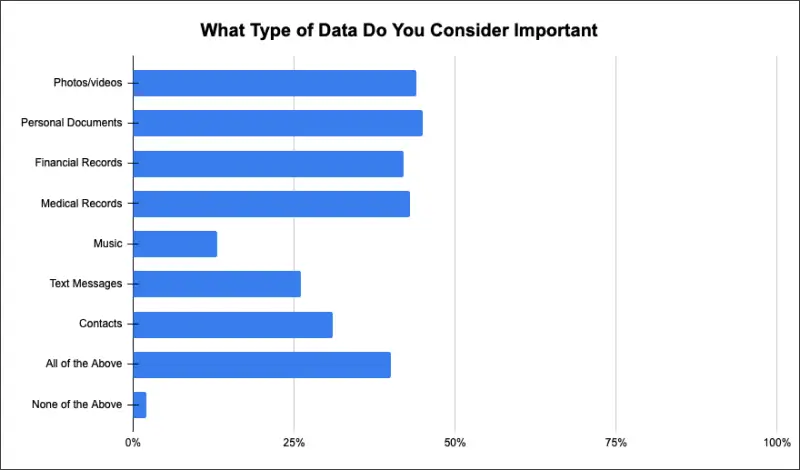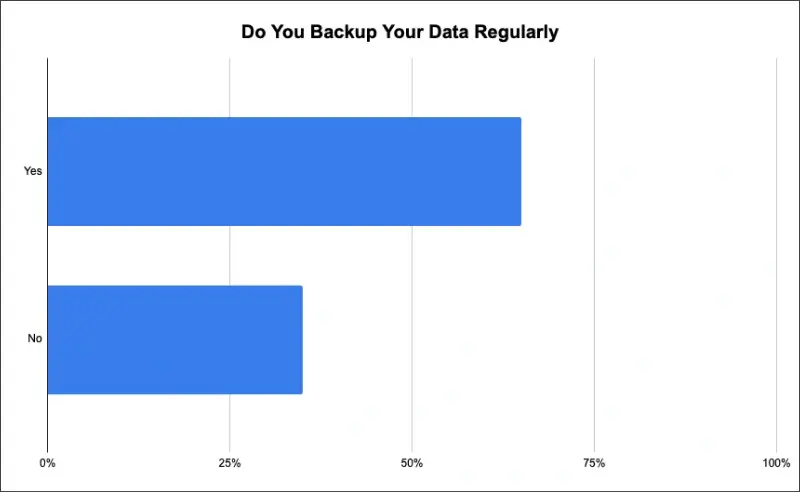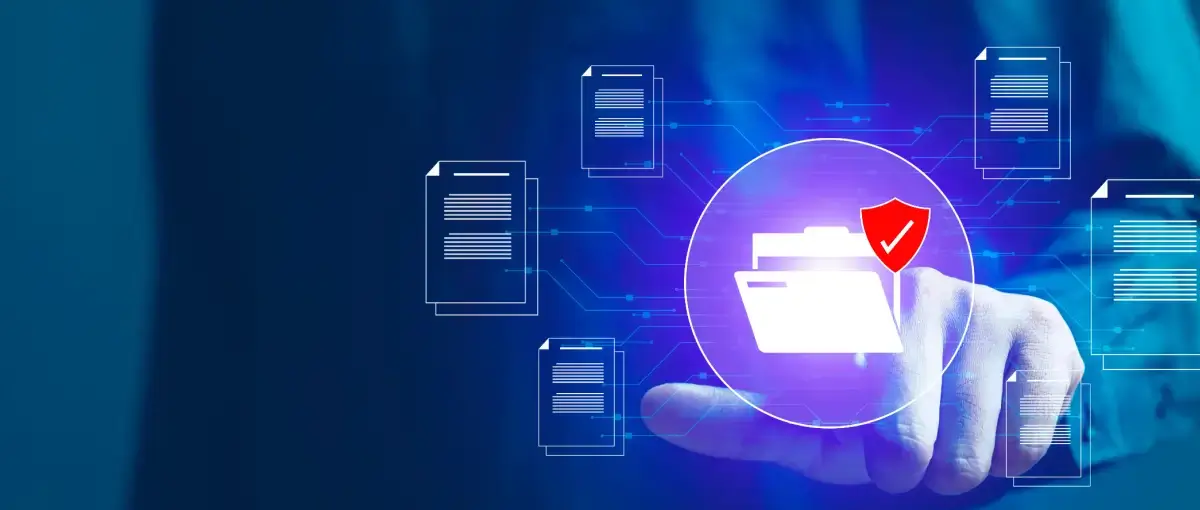According to a recent survey, 45% of Americans consider personal documents their most crucial data—and they're absolutely right. Be it medical records or your driver's license, personal data is the one thing that we all want to safeguard. Unfortunately, it's also the target of various online threats. In this article, we'll cover personal documents from start to finish, including their historical significance and legal implications.
Types of Data Americans Consider Important

The Significance of Personal Documents
If you're among those who consider personal documents your most important data, you're on the right track. After all, these documents contain the essential information that, from a physical and digital record standpoint, defines who we are.
From birth certificates to personal identity documents and financial records, our documents don't quite define us, but they do make us easier to identify. In times of crisis, they also serve as lifelines that allow swift access to social services.
By definition, personal documents include the following:
- names
- postal and email addresses
- telephone numbers
- driving licenses
- passports
- Social Security Numbers
When combined with these personal documents, biometric data, web cookies, and device IDs are used as additional identifiers. As mentioned, financial and medical records are forms of personal data, too.
Digitization Puts Personal Documents at Greater Risk
Digital documentation has been all the rage in recent years. This is convenient, but it also opens up a whole new level of online threats. As a result, cybersecurity and data protection are two key aspects that we all need to be mindful of.
It's not just cybersecurity, though. The regulatory landscape adds a few more layers of complexities on top of these concerns. This has had a notable impact on how we manage, share, and store these documents.
Seeing as personal documents contain such important data, and yet are so easily compromised, it's no wonder that the survey results underscore their importance. Let's explore them in greater detail.
Survey Methodology and Key Findings
Our survey involved asking 2,000 Americans two key questions: the type of data they considered most important, and whether they regularly backed up their data. Interestingly, just under half of all respondents considered some or all forms of data important. In addition, only 2% of individuals surveyed considered their data entirely insignificant.
We live in a time when every online action leaves behind digital breadcrumbs. As such, it's somewhat surprising that over half the respondents didn't consider their personal documents important.
However, in contrast, most of the respondents did indeed regularly back up their data. This suggests that despite not being convinced of its importance, many people make an effort to secure their data anyway.

Unsurprisingly, personal documents were considered most important by 45% of survey participants. This includes things like identity records and legal documents, which can be a major inconvenience if lost. It's not just about replacing them—it also involves a risk of having your identity stolen and misused by malicious hackers.
Similarly, financial documents and medical records are highly sensitive. A massive 42 - 43% of respondents acknowledged this accordingly. Losing these can have negative consequences on your ability to effectively manage your taxes, and can cause problems with insurance claims. And, worse still, it can expose you to the risk of financial fraud at the hands of cybercriminals.
Finally, 44% of participants said that their photos and videos were important to them. While these don't always have the same inherent risks as personal, financial, and medical documents, they come with a different set of risks.
This type of data often holds a sentimental value. As such, losing your photos can be pretty upsetting. There's a risk of cyber threats here, too. Malicious actors, such as cyber-ransom criminals, may try to extort you for financial gain if they get their hands on your personal photos.
Risks and Challenges Associated with Digitized Personal Documents
Nowadays, many of us have switched from using traditional documents to digital versions. On the whole, this has made accessing and using them more convenient and seamless. However, they also come attached with a host of nuanced risks. Malicious cyber attacks, a compromised or misplaced device, and accidental deletion are just some of the reasons why your digitized documents may go missing.
On the surface, the consequences of losing your documents can be dire. Misplaced tax records, identity documents, or legal contracts can cause anything from a minor inconvenience to a major disaster. We're talking about consequences such as financial fraud, a tarnished reputation, or identity theft.

Moreover, losing your personal documents can have more than just practical repercussions. If the files contain sensitive information, be it personal or professional, losing them can cause significant emotional distress. For instance, consider a set of documents containing the written will of a deceased family member. Losing this not only causes numerous legal issues but having to deal with it can also pose significant emotional stress.
Precautionary Measures to Help Keep Your Data Safe
Backing up your personal documents and other important data plays a key role in preventing their loss. You may still be faced with cybersecurity threats, but if your data is backed up, the chances of completely losing it are much lower.
It's not just your personal files that are affected by backups. In fact, digitized personal documents like financial records are just one of the things you might want to store safely. It's also possible, and advised, to back up things that simply make your life easier, such as work files, cached software information, or computer settings.
When it comes to backing up, you can do as little or as much as you're willing to do, but the two most common ways to store your files include cloud storage and local backups.
Cloud Storage
If your files are digital, why shouldn't your backup solution of choice be, too? That's exactly what cloud storage is. It involves saving data to an off-site storage system maintained by a third party. In simpler terms, it means you'll be uploading your files to the so-called cloud. Then, a company will store them for you, allowing you to access them through the internet at any time.
There are a few advantages to cloud storage, such as the fact that your files aren't on just one computer or hard drive, so the risk of being compromised is lower. Cloud providers usually offer robust security measures.
However, the downside of using cloud storage for personal documents is that it's all out of your hands. If your service provider is hit by a cybersecurity threat, your personal files may leak out without you even knowing about it.
Local Backups

The files that need to be safeguarded the most, such as medical records or bills, are often best stored in ways that are the most difficult to hack. Oftentimes, that means using physical devices such as external hard drives or USB flash drives.
This method comes with its own distinct advantages. It's free of subscription costs once you own the device and you maintain full control of your data. As long as the device is stored safely, it can serve you well for years.
The downside? Local backups are susceptible to physical damage. In addition, external drives, much like any other type of drive, can fail at any given moment. That's why the best data backup strategy is to store your personal documents not in one, but in at least two different places. One of them could, or even should, be cloud storage
The Survey Said It All: Personal Documents Matter
Whether you pick personal documents as the number one type of data that matters to you or not, one thing is clear: many people would. Our survey results show that respondents recognize the importance of personal documents. It could be your bank account information, or it could be your SSN. No matter what it is, if it ends up on the internet, it could spell trouble.
In the age of digitization, most of us no longer need to take frequent trips to the bank or apply for a new passport in person. When all of this is done online, it means that your data is at a greater risk than ever before. As such, it's important to protect it as best as you can.
Prioritize data safety and act before anything ever goes wrong. Get yourself on a regular backup schedule, and don't just settle for one backup solution; go for two. And, if anything goes wrong, don't hesitate to reach out to Secure Data Recovery for your data retrieval needs.
Data Recovery Solutions
The pain of losing personal documents stings for several different reasons—I've been there. Backing up is one way to prevent it, but that's not going to help if the data has already been lost. At that point, your best bet is to look into data recovery solutions.
How Data Recovery Works
Data recovery is exactly what it says on the tin. It refers to the process of retrieving inaccessible, lost, corrupted, or damaged data from storage devices. You can sometimes recover lost data by yourself, but oftentimes, it's best to reach out to a professional retrieval service.
Experienced technicians use various methods to restore lost data. Depending on the nature and the severity of data loss, they may resort to anything ranging from software-based solutions to complex physical repairs of damaged drives.
Working with professionals typically gives you the highest success rate when it comes to data retrieval. Recovery experts begin the process with careful analysis, scanning your storage medium to figure out what happened and how to fix it. Next, they choose the best way to retrieve your data.
Secure Data Recovery Can Restore Your Files
Secure Data Recovery is the leader in data retrieval. Our highly experienced technicians have dealt with countless repairs, ranging from waterlogged drives to complex software issues. With our 96% success rate and "No Data, No Recovery Fee" guarantee, Secure Data Recovery is the best way to get your personal documents back at no risk.
Contact us today at 800-388-1266 and let us help you restore your files!






